BIOGRAPHY
| De Moore, Greg | Tom Wills |
| Dessaix, Robert | Chameleon |
| Gould, Sally | Frog |
| Grenville, Kate | Unsettled |
| Kieza, Grantlee | Annette Kellerman, Australian mermaid |
| Niall, Brenda | Joan Lindsay |
 Joan Lindsay by Brenda Niall
Joan Lindsay by Brenda Niall
Winston Churchill once said of Russia, ‘It’s a riddle, wrapped in a mystery, inside an enigma.’ He could have been describing the life of Joan Lindsay, in her latter years one of Australia’s most celebrated authors, and yet few people knew her well. Brenda Niall, one of this nation’s most celebrated authors, particularly as a biographer, has turned her attention to the hidden life of Joan Lindsay, the woman who wrote Picnic at Hanging Rock. That remarkable novel, written when Lindsay was in her late 60s, made her name. But before and after the novel, then the highly successful movie of the same name, she was in the shadow of her husband, ebullient Sir Daryl Lindsay, a high achiever as a gallery director, painter, entrepreneur and expert networker. Niall claims that Joan entertained for Sir Daryl, supported his career, and was known as much for her flower arrangements as for her ideas. Clear-eyed about Joan’s early life, Niall describes her as being born into solid privilege and casual neglect in Melbourne. She was well endowed with money and social position but her parents had wanted a son and were disappointed by the birth of a third daughter in 1896. Niall had interviewed Lady Lindsay, then 87, when researching a biography of Martin Boyd, Lady Lindsay’s cousin. She had seemed vague and understated about herself as an artist, despite early art studies and a wide art knowledge. Niall paints a word portrait of Joan Lindsay as a highly self-contained, very private person, happiest in the couple’s rural home, but a willing and knowledgeable volunteer at the National Gallery in Melbourne after her husband became its director. To the end of her life, Joan Lindsay maintained that Picnic at Hanging Rock was a mystery story, and she had no idea what had happened to its subject schoolgirls. Good Reading, April 2025.
Return to top
COOKING
| Elliott-Howery, Alex | Pocket Pickler |
| Ottolenghi, Yotam | Ottolenghi comfort |
 Ottolenghi Comfort by Yottam Ottolenghi & Helen Goh
Ottolenghi Comfort by Yottam Ottolenghi & Helen Goh
Ottolenghi, now a household name when it comes to cooking, is back with Comfort, alongside fellow Ottolenghi team and test cooks Helen Goh, Verena Lochmuller and Tara Wigley. Ottolenghi has changed the way many people approach cooking. Bringing a plethora of ingredients to people’s households he has influenced how we think about salads, vegetables and the ingredients we work with. He has made tahini and pomegranate molasses staples in many a pantry. With the backing of Helen, Verena and Tara, Comfort is a true odyssey of different cultures, food and flavour. Through the different backgrounds of the ‘four hungries’, we are taken through a journey of pastas, soups, curries, traybakes, noodles, comfort veg, pies, bread and sweet things. This leaves you with many dishes of the east and west, balancing harmony and taste.You also might be thinking, how does one define comfort food and isn’t it different for everyone? They define it by four key components: who we eat with, why we eat, what we eat and how we eat. Summarised perfectly in Comfort they hope, ‘the recipes become for you what they are for us: reassuring on one hand but revitalising on the other; nostalgic and novel at the same time; creative and comforting. My personal favourites include the white poached chicken with Chinese cabbage and peanut rayu, a sumptuous blend of Asian flavours and spices, the quick ramen noodles with mushroom and the crispy roast potatoes with rosemary and za’atar. Overall, another staple cookbook to add to your collection, proving that Ottolenghi rarely misses and always keeps food exciting and different. Good Reading, November 2024.
Return to top
GENERAL FICTION
| Adichie, Chimamanda Ngozi | Dream count |
| Baldacci, David | Strangers in time |
| Brickley, Holly | Deep cuts |
| Brown, Naima | Mother tongue |
| De Kretser, Michelle | Theory & practice |
| Flynn, Laurie Elizabeth | The girls are all so nice here |
| Gemmell, N. J. | Wing |
| Han, Kang | Greek lessons |
| Hollinghurst, Alan | Our evenings |
| Knox, Malcolm | The first friend |
| Lester, Natasha | Mademoiselle alliance |
| Neuhaus, Susan | The surgeon of Royaumont |
| O’Donnell, Roisin | Nesting |
| O’Loghlin, James | Liars |
| Patterson, James | Hard to kill |
| Pekkanen, Sarah | Gone tonight |
| Prak, Michelle | Barren Cape |
| Sakhlecha, Trisha | The inheritance |
| Schlink, Bernhard | The granddaughter |
| Whitaker, Chris | All the colours of the dark |
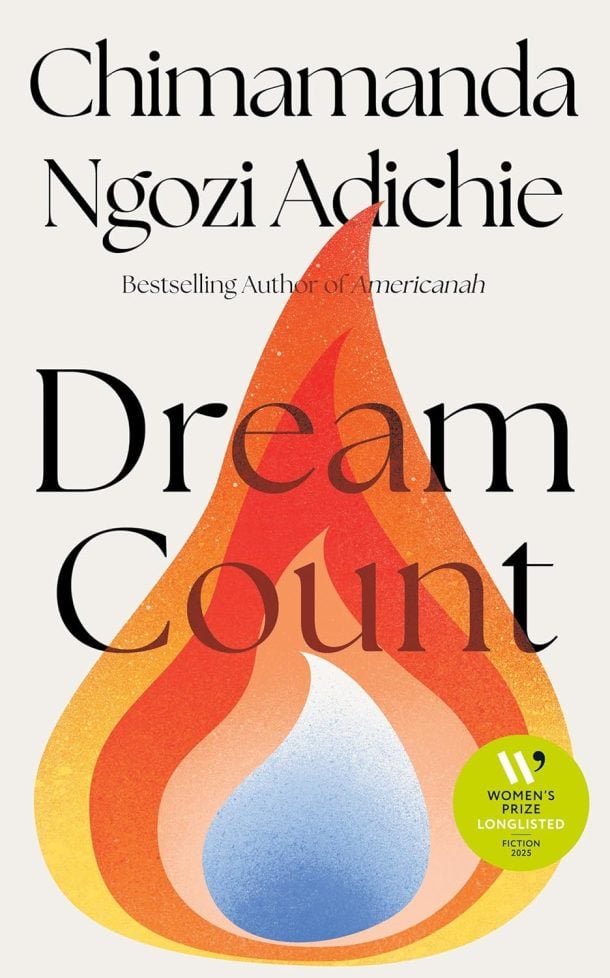 Dream Count by Chiamaka Adichie
Dream Count by Chiamaka Adichie
Four Nigerian women are poised at emotional crossroads that compel them to scrutinize their lives. Isolated by the 2020 Covid-19 pandemic, Chiamaka, a novelist-turned–travel writer sheltering in suburban Maryland, is struggling to stave off boredom and loneliness through regular Zoom calls with family and friends in the U.S., Europe, and her native Nigeria. It’s not enough, and soon this professional tourist resorts to filling the empty spaces of time with mental excursions through the ruins of past love affairs beginning with Darnell, “the Denzel Washington of academia,” whose magnetism created waiting lists for his art history classes and had Chiamaka looking past his personal slights—for a while, anyway. Then there was Chuka, a more considerate and less mercurial man who shared both her African homeland and an address in the Washington, D.C., area. Nothing wrong there besides what Chia characterizes as “that exquisite ache of wanting to love a lovely person that you do not love.” As in her previous works of fiction—most recently Americanah (2013)—Adiche makes her prose hum and throb with elegantly wrought and empathetic observations. This style extends into the stories of three other Nigerian women in Chia’s life. Zikora, her best friend, is a tough-minded attorney accustomed to speaking brutal truths to others but vulnerable to ill-starred love affairs with men she thinks of as “thieves of time,” one of whom leaves her while she’s pregnant, forcing her to raise a child alone—though not without unexpected help. Kadiatou, Chia’s housekeeper, has overcome challenging odds in raising her gifted daughter, Binta, by herself in America, but is the innocent victim of a sordid scandal that jeopardizes her future. And Chia’s cousin, the glamorous, self-possessed Omelogor, is a formidable presence in Nigerian finance but prone to melancholy, rumination, and regret. In today’s world, when people seem at once too cut off and too much in each other’s business, readers will feel communion with these tense, put-upon, yet resilient women in crisis. Adichie weaves stories of heartbreak and travail that are timely, touching, and trenchant. Kirkus Reviews, January 2025.
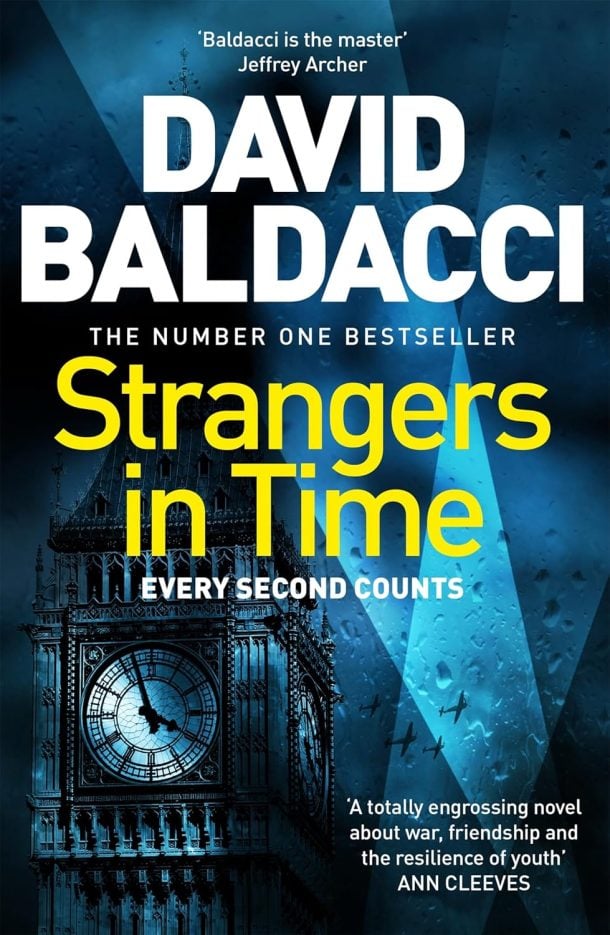 Strangers in Time by David Baldacci
Strangers in Time by David Baldacci
Three strangers become friends amid the Nazi bombing of London. In 1944, fierce aerial fighting rages over London as the bombs and rockets continue killing and maiming English civilians. A 13-year-old “East End bloke” navigates the rubble and looks for things to steal. He always wishes for inclement weather so the Jerries won’t bomb them. In the few pieces of clothing he owns, his gran has sewn a label: “The Honorable Charles Elias Matters,” with his address. His parents and grandfather have been killed, and Gran thinks Charlie is going to school every day. Instead, he’s decided to get his education on the street. The well-to-do 15-year-old Molly Wakefield returns from the safety of the countryside to her parents’ London house, but the parents are nowhere to be found, and she meets Charlie as he hides in her yard. Ignatius Oliver runs The Book Keep in Covent Garden, a shop started by his late wife, Imogen. Charlie sneaks in and nicks some money and a book filled with blank pages, imagining he can sell it for the paper, but when he realizes that Ignatius knows where he lives, he tries to return everything. Ignatius catches him, but lets him keep the book, which plays a fateful role when it changes hands again. Before long the three become friends, all sharing common bonds of danger, humanity, and heartbreaking loss. All have their complex stories: Despite her youth, Molly wants to treat the wounded, and she’s good at it; Ignatius is a part-time air warden who’s burdened by a dark secret about himself; and Charlie is party to a foot chase in which one of his mates and a police officer are accidentally killed. Charlie frets that he might hang. Meanwhile, the buzz of the V-1 rocket gives way to the silence of the V-2, and life or death are the devil’s toss of a coin. Baldacci weaves the trio’s lives together seamlessly, even though each comes from a different stratum of society. Hope, excitement, and tragedy will keep rapt readers reaching for their tissues. Kirkus Reviews, March 2025.
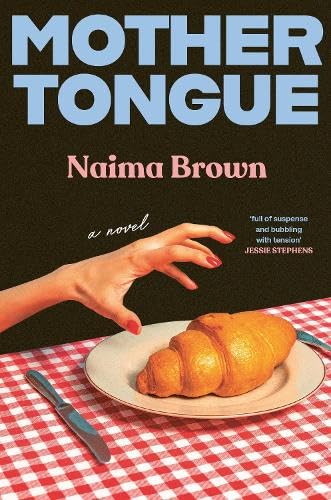 Mother Tongue by Naima Brown
Mother Tongue by Naima Brown
Brynn isn’t sure if she’s happy with her life. Her husband Eric’s conservative and Bible-thumping beliefs grow more intense every day. Her best friend, Lisa, who desires Eric for herself, has just utterly humiliated Brynn at her daughter’s fourth birthday party. And while she loves her daughter, Jenny, she always thought there would be something more to life beyond the mundanities of motherhood.When Brynn ends up in a coma after a traumatic fall, she wakes up speaking fluent French with a perfect accent. Everyone feels upended by this sudden change to their lives, but Brynn finally feels that sense of home she’s been searching for her whole life. In the years that pass after Brynn flees her family to begin a new life in France, dark secrets will be revealed, anxieties will turn into fanatical obsessions, and their lives will never be the same again, for better or for worse. Mother Tongue is definitely the most unpredictable book I’ve read this year, from the beginning to its explosive ending, but in the best way possible. It is absolutely fascinating how Brynn finds herself in another language that feels more like her mother tongue than her first language. It nurtures her, comforts her when she is alone, and makes her stronger, as a mother would. But it is doubly intriguing and concerning that while Brynn is exploring newfound freedom, the people around her, including her now teenage daughter, are becoming more restricted and programmed by the abuse and dark side of language.Naima Brown has written an addictive family drama that explores motherhood, gender expectations, religious and political zealotry, and the pursuit of freedom. But more than anything, Mother Tongue reveals to us the power of words – how they are used to control and bind us, how they influence us, and how they set us free. Readings Magazine, March 2025.
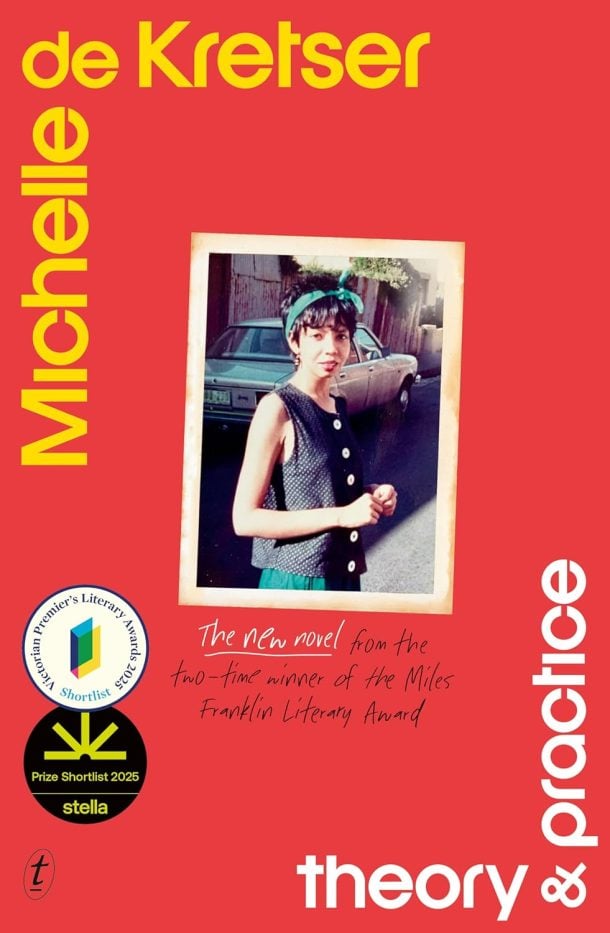 Theory & Practice by Michelle de Kretser
Theory & Practice by Michelle de Kretser
An Australian graduate student is torn between a life of the mind and the difficult realities of living as an immigrant and a woman in 1980s Melbourne. The narrator of de Kretser’s seventh novel arrives as a master’s degree student in Melbourne to write a thesis on the late novels of Virginia Woolf. It’s 1986 and Big Theory is king at universities across the globe. The narrator’s advisor, a feminist scholar, gives her a reading list rampant with Derrida and Foucault and sets her to work. Ideas aren’t the only things weaving their tentacles through the narrator’s life. She embarks on a fraught love affair with Kit, an engineering student who is decidedly not single, though she sometimes wonders if her silent rivalry with Kit’s girlfriend, Olivia, is at the root of her obsession. (In bed with Kit, she thinks, “Olivia and I were exchanging messages about possession and power. Kit was only the paper on which we were writing to each other.”) The narrator also exists in an uneasy limbo with her mother, her only living parent, who remains back home in Sydney, having emigrated from Sri Lanka with the narrator and her late father in the early 1970s. And then there’s the “Woolfmother” herself, hanging in poster form on the narrator’s walls, and with whom the narrator’s relationship is permanently altered upon reading a racist passage in Woolf’s diaries during her research. The narrator’s strained relationships with these women cause her shame, complicating her sense of what feminism should be. This restless, searching novel asks: Can any theory ever encompass the messy complexity of human emotion? De Kretser continues to shapeshift formally with each novel, but offers her characteristic blend of moral clarity, bite, and sumptuous style. A ferociously intelligent novel from a writer at the height of her powers. Kirkus Reviews, November 2024.
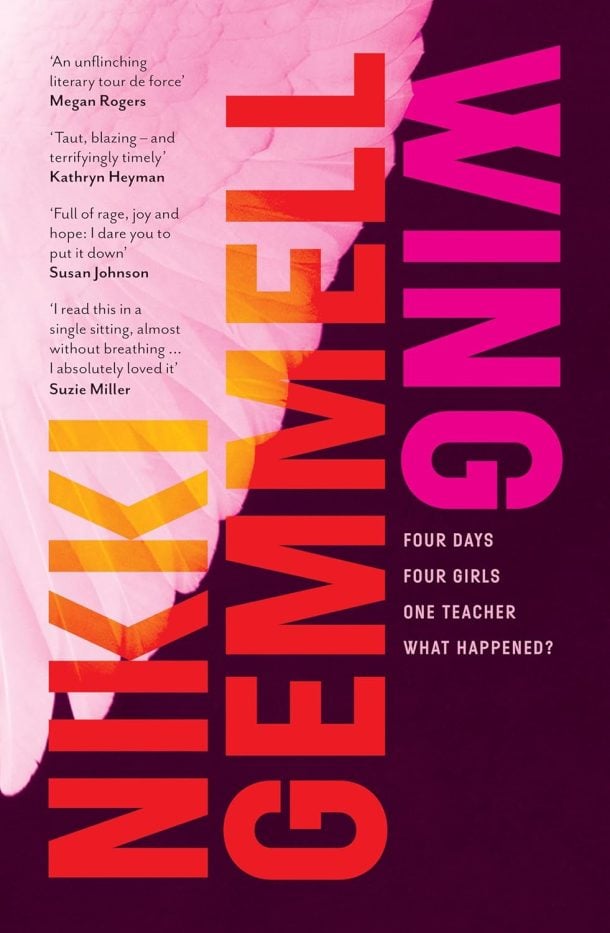 Wing by Nikki Gemmell
Wing by Nikki Gemmell
Nikki Gemmell is such an exquisite writer. I’m compelled to re-read, just to savour her unique style, use of uncommon adjectives, her turn of phrase and sentence structures. The story is gripping from the start. A group of four girls and a male teacher from an elite girl’s school (Koongala) go missing in the mountains in the Australian bush. These girls are no ordinary students. They are the ‘Cin’ girls, a gang of four who are bonded but totally unalike. Cinnamon (Cin) is the unofficial leader, a charismatic but rebellious girl-woman, Tamsin, willowy, an ice queen with wealthy parents, Willa, mixed-race and gorgeous and Elle, squarish and unattractive, the odd-bod of the group. Both students and teachers revere them. We are cleverly led through the story by the school principal who is Cin’s godmother, but this is kept secret at the school. This woman has carefully curated her appearance and lifestyle. She’s a state school kid who dazzled her way into Koongala and moulded these girls with her own version of gender politics. She believes that to be a single woman by choice and exhilarated by it, is a dangerous thing. The girls return, one by one, but they are changed. It’s as though their collective spirit has been crushed. They claim they didn’t see their teacher, but other than that, they are not talking. He remains missing. This is a story about difficult relationships; between mothers and daughters, friends, old and young, men and women, principals and parents. It’s about what it is to be a woman today and its a mesmerising read. Good Reading Magazine, October 2024.
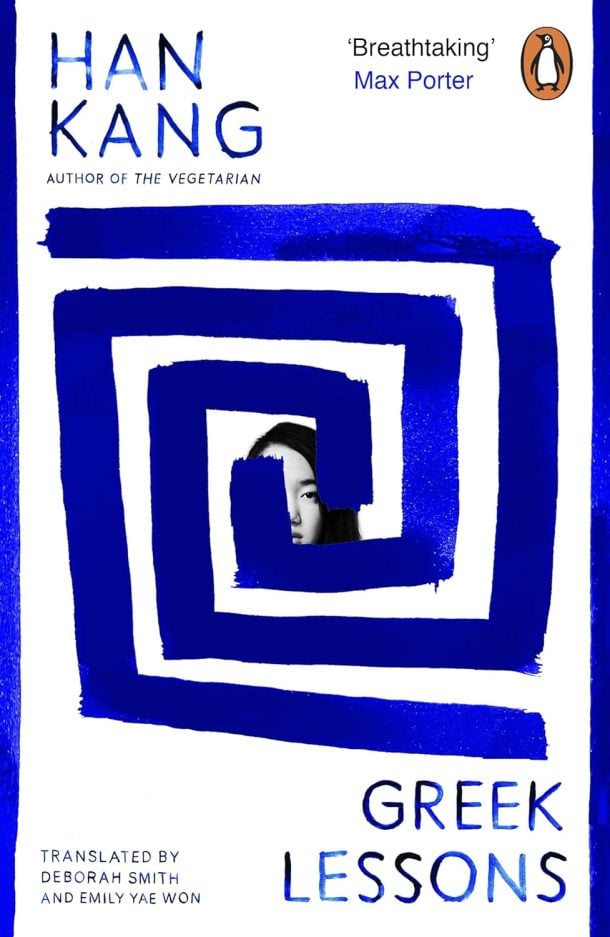 Greek Lessons by Han Kang
Greek Lessons by Han Kang
Booker winner Han (The Vegetarian) explores the borders of the senses in this delicate love story. An unnamed Korean woman living in Seoul stops speaking after her mother dies and she loses custody of her eight-year-old son. An interest in language, though, continues to tug at her, and she enrolls in a Greek class. There, she begins writing poetry that catches the eye of her instructor who, unbeknownst to anyone else, is slowly losing his sight. Split between his dual homelands of Korea and Germany, the instructor picks up on the student’s search for a language beyond what can be expressed or seen with the naked eye, something the woman gestures at in her poetry: “a language as cold and hard as a pillar of ice.” In prose that merges memory, story, and poetry, Han tracks how the two find in one another what is missing from the sensual world. This brilliant, shimmering work is never at a loss for words even when exploring the mind of a woman who won’t speak, and its pursuit of an authentic, exquisite new form is profound. Once again, Han demonstrates great visionary power. Publisher’s Weekly, January 2023.
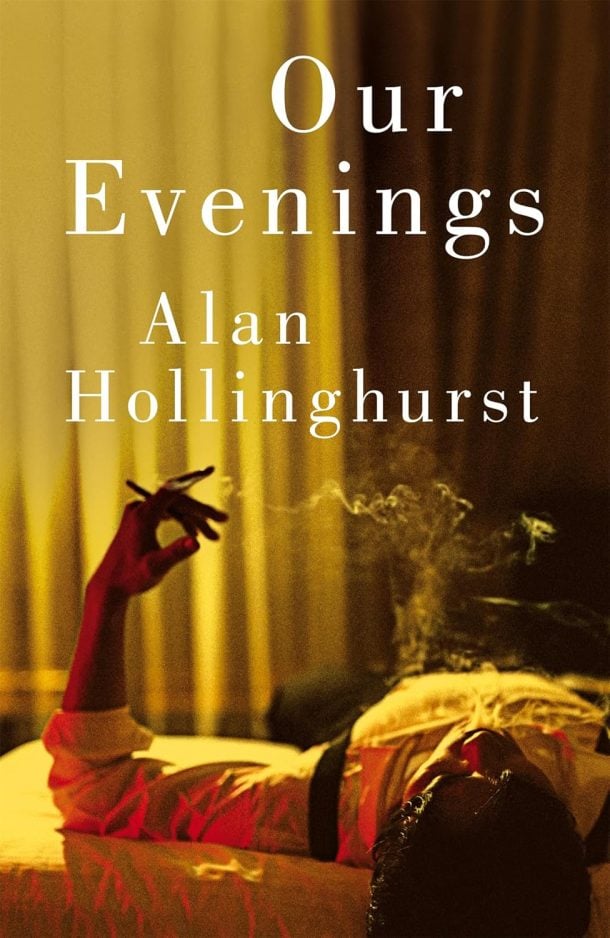 Our Evenings by Alan Hollinghurst
Our Evenings by Alan Hollinghurst
Booker winner Hollinghurst (The Line of Beauty) traces the divisions of post-Brexit London in this elegant tale of two men’s divergent paths across decades. Dave Win, an aging gay actor, fondly remembers Mark Hadlow, the philanthropist who sponsored his education, after Mark’s death at 94. Hadlow funded Dave’s boarding school scholarship in the 1960s, where Dave was classmates with Mark’s bully son, Giles, now a leading Brexiteer whose own mother calls him an “authoritarian.” In what proves to be a brilliant stroke of misdirection, Hollinghurst suggests in the opening pages that the novel will be Giles’s. Instead, Dave takes center stage, devoting the bulk of his narration to a life well lived, despite homophobic intimidation at school and the racial prejudice he faced during his career, which often saw him typecast in servant roles (he’s half Burmese). He recounts the loving relationship he has with his single mother, Avril, a dressmaker; his success in the theater; and joyful romantic relationships. Neither he nor the reader ever learns the details of Avril’s brief liaison with Dave’s biological father in Burma after WWII, but its mystery charges the pages with melancholic intensity, as do the prejudices Dave faces throughout his life, which define his fate in the wrenching conclusion, when Giles’s vision of the world plays a decisive part. Hollinghurst proves once more to be a master of emotive prose. It’s a tour de force. Publisher’s Weekly, August 2024.
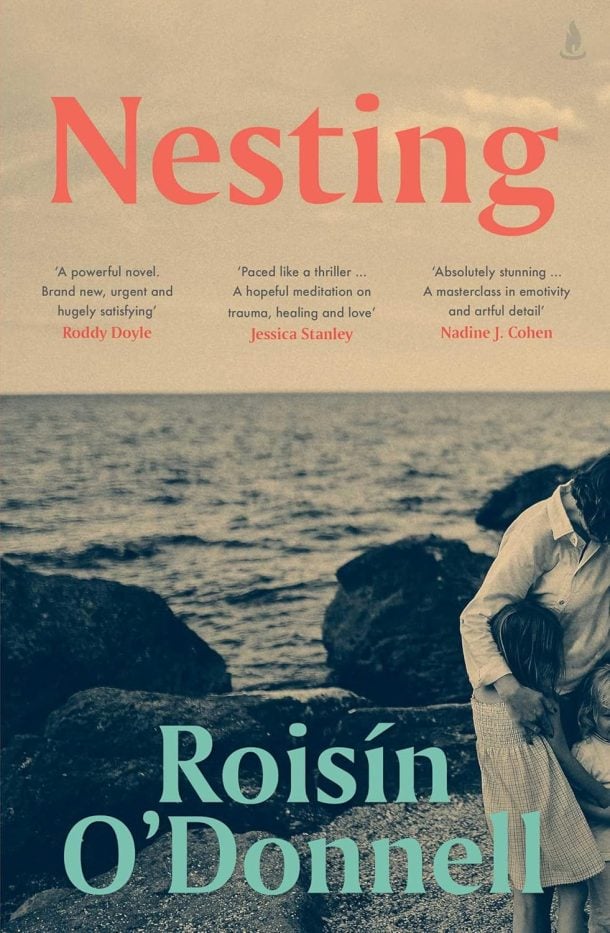 Nesting by Roisin O’Donnell
Nesting by Roisin O’Donnell
In Dublin, a pregnant woman with two little girls flees a controlling, critical husband. O’Donnell’s striking debut opens with what looks from a distance like a happy family at the seashore. Close up, the water is too cold, the wind is too strong, and as tiny as they are, the girls have outgrown their wetsuits and their father is screaming at their mother, demanding to know what she’d done with the money he gave her to buy new ones. By the end of the first chapter, we want to get away from Ryan as badly as Ciara does, even if he’s handsome, loyal, a good provider, and hasn’t actually hit her…yet. That wetsuit money has been tucked away in a diaper bag in preparation for something Ciara hasn’t quite admitted to herself she’s going to do. And then, at last, it’s time. O’Donnell’s novel follows Ciara, Ella, and Sophie as they negotiate the harsh realities of sudden homelessness, father’s rights, and the Irish housing crisis. Ciara’s mother and sister live in England, she’s lost her pre-marriage friends, and she can pay for no more than one night’s accommodation with that roll of bills. With Ryan constantly hounding her by text, she eventually finds her way into emergency accommodations in a hotel with a dedicated floor for unhoused women and families. Here, she will make a friend and begin to figure out next steps—which are that much more complicated when a pregnancy test reveals the reason for her recent nausea and exhaustion. The mounting tension and suspense as Ciara struggles to stay free and safe make the pages fly. O’Donnell gives us a great character to root for and a portrait of her situation that is both terrifying and ultimately inspiring. An afterword confirms the impression that it’s based on research into real women’s experiences. A propulsive, nuanced, achingly real novel that will appeal to both Colleen Hoover fans and devotees of Irish fiction. Kirkus Reviews, October 2024.
 The Granddaughter by Bernhard Schlink
The Granddaughter by Bernhard Schlink
Schlink (The Reader) delivers a touching narrative about an elderly man’s discovery of his wife’s secrets. After Kaspar Wettner’s wife, Birgit, accidentally drowns in a bathtub, he finds a diary in which she reveals that before they married in the 1960s, she gave birth to another man’s child and left the girl on a doorstep. With the help of the nurse who delivered the baby, he locates Birgit’s daughter, Svenja, in the neo-Nazi community where she’s living with her husband, Björn, and their 14-year-old daughter, Sigrun. At first, Björn bars Kaspar from seeing either Svenja or Sigrun, but he eventually agrees to let Sigrun visit Kaspar in Berlin in exchange for the inheritance Kaspar says Birgit provided for her. During Sigrun’s visits, Kaspar tries to dispel her of neo-Nazi beliefs by giving her books and articles debunking them. As Kaspar and Sigrun grow closer and explore Berlin’s art scene, they form a bond despite their political differences and Kaspar’s fear that Björn could curtail the visits. Schlink offers an unflinching look at the neo-Nazi movement and the compromises people make out of love. It’s a powerful story of loss and the desire to move forward. Publisher’s Weekly, October 2024.
Return to top
MYSTERY
| Anderson-Wheeler, Claire | The Gatsby gambit |
| Beaumont, Mandy | The thrill of it |
| Brett, Simon | Death in the dressing room |
| Caro, Jane | Lyrebird |
| Coben, Harlan | Nobody’s fool |
| Connally, Celeste | All’s fair in love and treachery |
| Daws, N. R. | Murder at the palace |
| Eva Björg Ægisdóttir | You can’t see me |
| Everett, C B. | The other people |
| Foster, Sara, | When she was gone |
| Gardiner, Kelly | Miss Caroline Bingley, private detective |
| Gerritsen, Tess | The summer guests |
| Griffiths, Elly | The frozen people |
| Hampson, Amanda | The deadly dispute |
| Hornsley, Sarah | Bad blood |
| Ichaso, Chelsea | We were warned |
| Kernick, Simon | You all die tonight |
| Lally, Megan | No place left to hide |
| Miller, C. L. | Death on the Red Sea |
| Nagendra, Harini | A nest of vipers |
| Patterson, James | 2 sisters murder investigations |
| Pip Fioretti | Skull River |
| Plante, Lynda La | Crucified |
| Pliego, Ande | You are fatally invited |
| Rimington, Stella | The hidden hand |
| Ward, Gareth | Tea and cake and death |
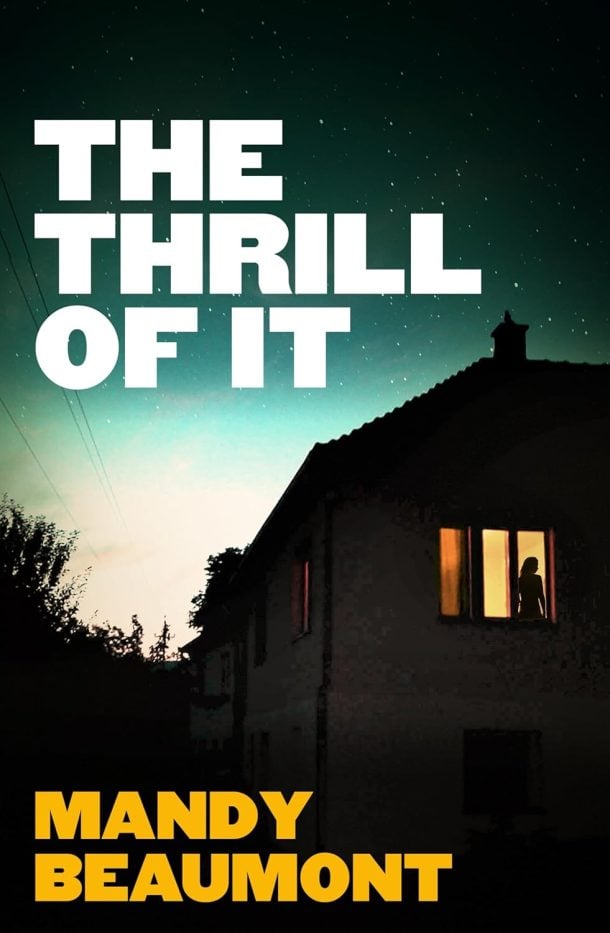 The Thrill of It by Mandy Beaumont
The Thrill of It by Mandy Beaumont
The Thrill of It is the latest crime novel by Mandy Beaumont, author of the Stella Prize–longlisted The Furies. The story follows Emmerson Kerr, whose grandmother was brutally murdered in 1977, and an unnamed man with a driving desire to humiliate and kill older women. The novel fictionalises a spate of murders that took place in Sydney in 1980, committed by a serial killer known as ‘The Granny Killer’. Beaumont takes readers into the mind of a killer whose intense misogyny is complicated by a deep-seated mother complex. The reader is drawn into his dark thoughts, desires, anger and distorted expectations of women and the world. The chapters alternate between Emmerson and the killer, and while their thoughts and actions differ, their tones are surprisingly similar. The other characters also feel somewhat underdeveloped. While we’re told, for example, that Emmerson’s grandmother isn’t who she appeared to be, or that the detective on the case is old-fashioned, these traits aren’t fully explored or carried through in the story. What Beaumont does well is exploring themes of misogyny, sexism, violence against older women, and the importance of trusting your gut. As a writer, she demonstrates a smooth, efficient style that makes The Thrill of It a fast-paced and entertaining read. Fans of Laura Elizabeth Woollett’s Beautiful Revolutionary and Australian crime authors such as Garry Disher and Tom Baragwanath will appreciate this novel. Books+Publishing, January 2025.
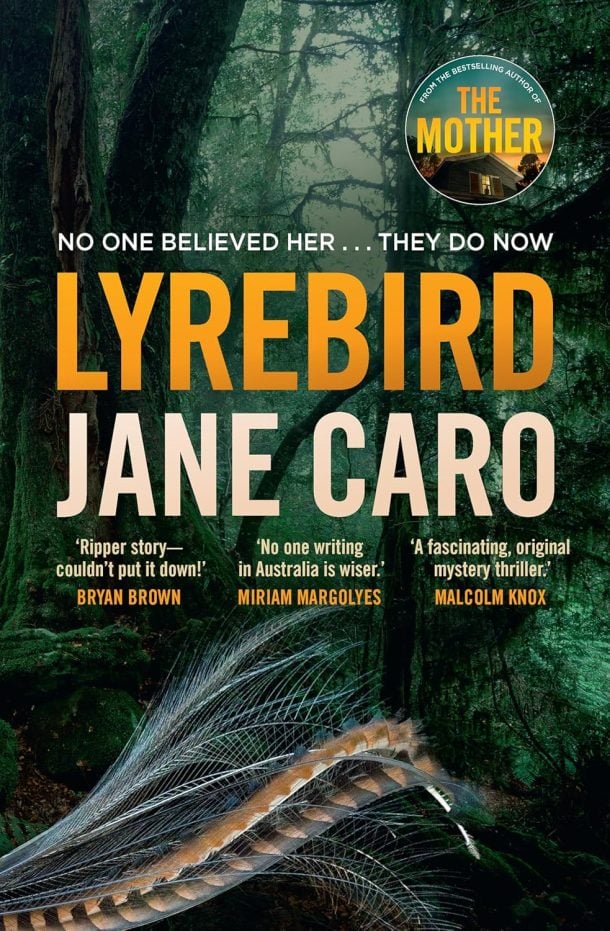 Lyrebird by Jane Caro
Lyrebird by Jane Caro
Is there anything more satisfying than heading to bed with a crime novel written by a feminist? Truly, the comfort in knowing all female characters will be represented with respect and honour warms my heart. And with Jane Caro’s second crime novel, you can expect more than just a mystery to be solved. Caro, an enthusiastic defender of women’s rights and the environment, gives the reader both a solid reprimand and a reminder of the state of our national parks and wildlife. She takes delicious swipes at the media and at our universities. Without giving away too much of the plot here, Caro highlights the woes of women working on tourist visas, and the poverty and desperation in our neighbouring countries. She writes about grief with an empathetic touch. ‘I certainly inhaled it and was delighted with Caro’s astute representation of everything that is going wrong in our country, as well as with her very entertaining writing. ‘The premise of the book is immediately introduced: a lyrebird begins its mating call in the forest, videotaped by ornithologist Jessica Weston. The lyrebird mimics the sound of a woman dying. Detective Megan Blaxland works the case, but does not solve it. It goes into the cold case file. Twenty years later, a damaged female body is found where the lyrebird had danced. Blaxland comes out of retirement to solve the mystery. The two women reunite as they search for an answer, and a classic, thrilling story begins. I am hoping this is not the end of Megan Blaxland; she is not unlike Ann Cleeves’ popular character Vera, and that is a particularly good thing indeed. Readers who enjoyed Caro’s The Mother will be incredibly pleased with her new novel. I certainly inhaled it and was delighted with Caro’s astute representation of everything that is going wrong in our country, as well as with her very entertaining writing. Readings Magazine, March 2025.
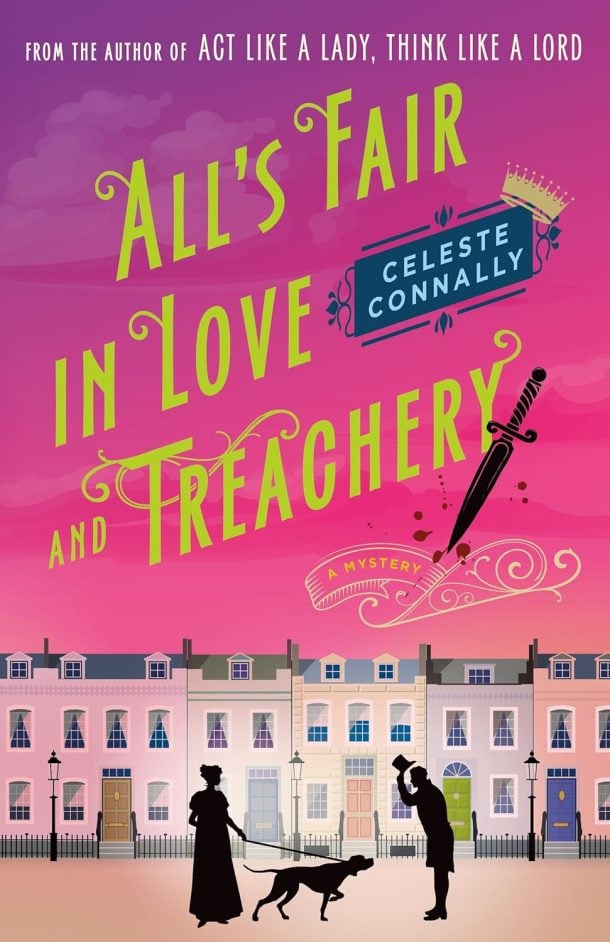 All’s fair in love and treachery by Celeste Connally
All’s fair in love and treachery by Celeste Connally
A free-spirited noblewoman solves multiple crimes in Regency England. Lady Petra Forsyth, unmarried daughter of the Earl of Holbrook, lives an enviable life. In her father’s house off Berkeley Square, a small complement of servants keeps her free from prying eyes as she entertains her lover, Duncan Shawcross, illegitimate son of the late Marquess of Langford and grandson of the Duke and Duchess of Hillmorton. Her relationship with Shawcross is pretty much an open secret among London’s elite. It is in fact his grandmother who brings Lady Petra to brunch with Queen Charlotte. But one day the Queen, who seems to entertain her subjects at home quite regularly, has a special request for Petra: She wants her to investigate the sudden death of the matron at the Asylum for Female Orphans, where noblemen of the realm routinely stash daughters born of their irregular liaisons with housemaids. Although she’s preoccupied by the recent revelation that Emerson—Viscount Ingersoll, her late fiance—may have been murdered, Petra can’t deny her majesty’s request. At the orphanage, she finds a tangled skein of deception, stolen inheritances, and murder. As a bonus, she also discovers a plot by a band of subversives to overthrow the monarchy. Although its haute ton setting nods at Bridgerton, Lady Petra’s story owes more to Sex and the City. She and gal pals Lady Caroline and Miss Charlotte Reed carouse to their heart’s delight, unburdened by financial constraints. They do solve those puzzles, but their brand is joie de vivre. A light and lively romp. Kirkus Reviews, October 2024.
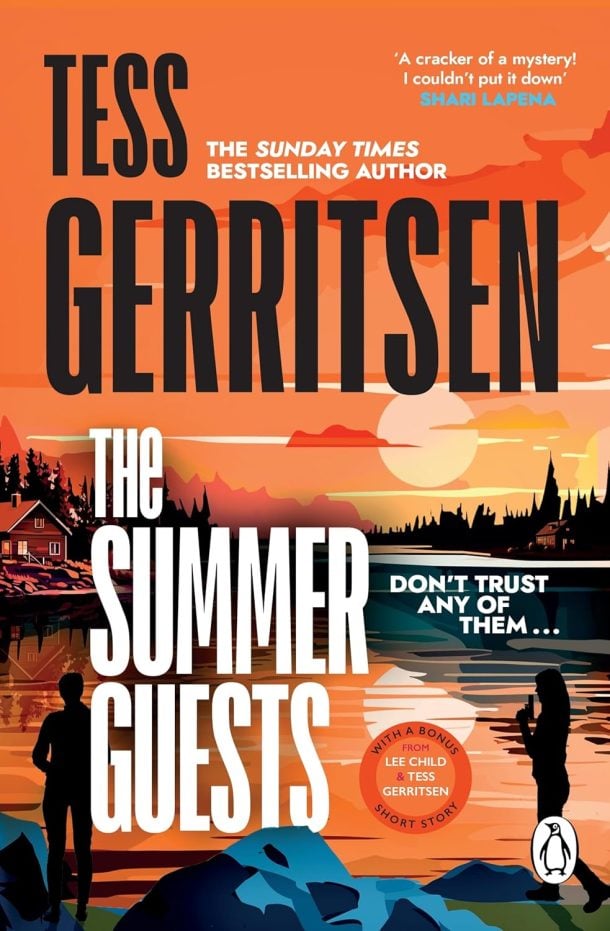 Summer Guests by Tess Gerritsen
Summer Guests by Tess Gerritsen
Summer guests find big trouble in Purity, Maine, in this sequel to The Spy Coast (2023).In 1972, a Purity policeman watches a driver mow down and kill three innocent people on Main Street. Then the madman shoots the officer, and soon they are all dead. Investigators never learn why such an ordinary, apparently law-abiding citizen suddenly committed such a ghastly act, and the sad story gradually fades. Jump a half-century to the present day, when the Conovers, a family of longtime summer residents, are arriving back in town. Fifteen-year-old Zoe goes swimming in Maiden Pond with a newfound friend and mysteriously disappears later that day. She is an excellent swimmer and diver, so drowning seems unlikely. Perhaps she has been abducted, perhaps worse. She is not “the sort of girl you’d think would get into trouble.” Naturally, Zoe’s parents are frantic. Enter acting Police Chief Jo Thibodeau and the Martini Club, a delightful group of five retired government spooks who just love a good puzzle to keep their aging brains in shape. They are merry meddlers who keep trying to help Thibodeau, a “dogged investigator” who resists their aid, or tries to. The Martini Club asks the acting chief to keep them in the loop, and of course she wants them nowhere near the case. But by that time, the five ex-spies are already involved, and one of them, Maggie Bird, surmises that this is most likely a kidnapping case. Maiden Pond is central to the story. There are a mix of houses around it, on one side seasonal rentals for the well to do, and on the other—the marshy, buggy side—permanent homes for the locals, such as the son of the long-ago murderer. Nobody waves at Reuben Tarkin, a social outcast because of his father’s heinous crime. The Conovers say he’d harassed their nanny to the point where she’d suddenly up and quit. Meanwhile, the investigators chase down clue after clue, wondering the who, what, and why of it all. The Conovers doubt Thibodeau’s abilities, believing she’s in over her head. The Martini Club folks continually impress her with their insights. “You people just love being smarter than me, don’t you?” But secrets and plot twists abound, and their collective intellect may not be enough. A complex mix of fright and fun. Kirkus Reviews, March 2025.
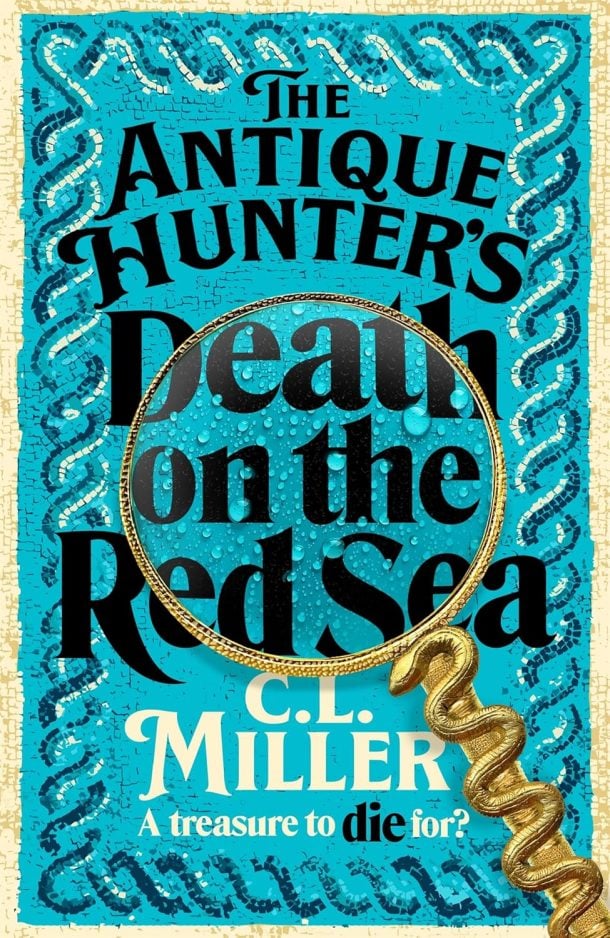 The Antique Hunter’s Death on the Red Sea by C.L. Miller
The Antique Hunter’s Death on the Red Sea by C.L. Miller
In the entertaining sequel to The Antique Hunter’s Guide to Murder, Miller once again explores the dark underbelly of the antiques trade. Spunky 47-year-old Freya Lockwood and her vivacious aunt Carole have recently inherited Crockleford Antiques from the late Arthur Crockleford in the English village of Little Meddington. In addition to running Arthur’s shop, Freya and Carole carry on Arthur’s work exposing the black-market trade in art and antiquities. To that end, Freya accepts an invitation to serve as an in-house expert for an antiques-themed cruise from Cyprus to Jordan—an engagement she assumes Arthur had agreed to before his unexpected death. While onboard, her true mission is to ferret out the identity of a mysterious dealer known only as The Collector, who heads an international thieving syndicate. It proves a difficult task, considering that the ship is awash with double-dealers, fraudsters, and at least one killer, the latter of whom raises the stakes of Freya’s sleuthing from securing stolen goods to preventing murder. Readers steeped in the antiques world will be delighted by Miller’s robust knowledge of the trade, and Freya remains an appealing protagonist. This series continues to deliver. Publisher’s Weekly, November 2024.
Return to top
NON FICTION
| Clarke, Andrew | Australian football’s 100 year club | 796.34 CLAR |
| Edge, Suzie | Vital organs | 611 EDGE |
| Ford, Andrew | The shortest history of music | 780.9 FORD |
| Jackson, Julian | France on trial | 944.08 JACK |
| Macintyre, Ben | The siege | 356.16 MACI |
| Skehan, Patricia | The secrets of Anzac Ridge | 940.30 SKEH |
| Walter, Harriet | She speaks! | 792.9 WALT |
| Wright, Clare Alice | Naku Dharuk | 333.20 WRIG |
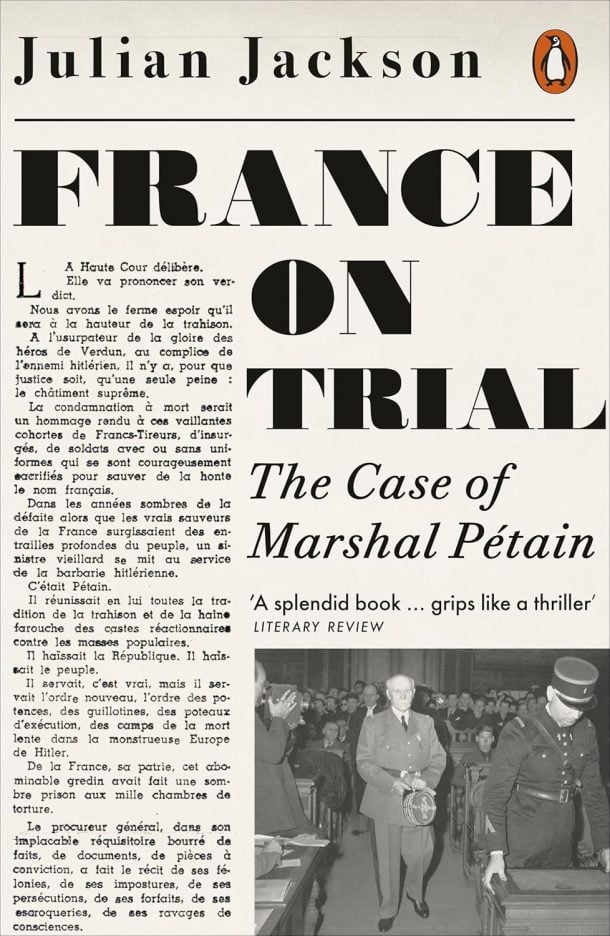 France on Trial by Julian Jackson.
France on Trial by Julian Jackson.
A captivating account of the 1945 trial of the French marshal who had agreed to an armistice with the Nazi regime in 1940. Jackson, a professor emeritus of history and author of the prizewinning De Gaulle, reminds readers that Philippe Pétain (1856-1951) “was unanimously viewed as a savior when he took over as head of the so-called Vichy regime”—although opinion was far more divided by the end of the war. The trial was obviously a political event with a guilty verdict almost guaranteed, but it was not a charade. Pétain’s lawyers mounted a vigorous defense, and the trial that obsessed the nation was compared to those of Louis XVI and even Joan of Arc. Jackson begins with the events following August 1944 when, with Allied armies sweeping across France, the Nazis forcibly evacuated Pétain and many loyal followers to a castle in Germany, where they occupied themselves with fantasies about returning after Hitler recovered from this temporary setback. Leaving in April 1945, Pétain returned to France, where preparations for his trial in absentia were already in progress. Few French officials, de Gaulle included, welcomed his arrival. Readers will be intrigued by Jackson’s lucid explanations of the unfamiliar French legal system in which both judge and jury can quiz witnesses. He was tried for treason, and the author delivers a dense, informative account that confronts broad moral and philosophical questions, enlivened by the witnesses’ often bitter hatred of Pétain and each other. Convicted, he was sentenced to death, which de Gaulle commuted to life imprisonment, “as the court had recommended and as he had always privately intended.” Readers will not be surprised to learn that this was a controversial decision, and they will thoroughly enjoy Jackson’s final 100 pages, which recount the persistent, often grotesque efforts to rehabilitate Pétain and Vichy that continue to this day. A highly insightful work of French history. Kirkus Reviews, May 2023.
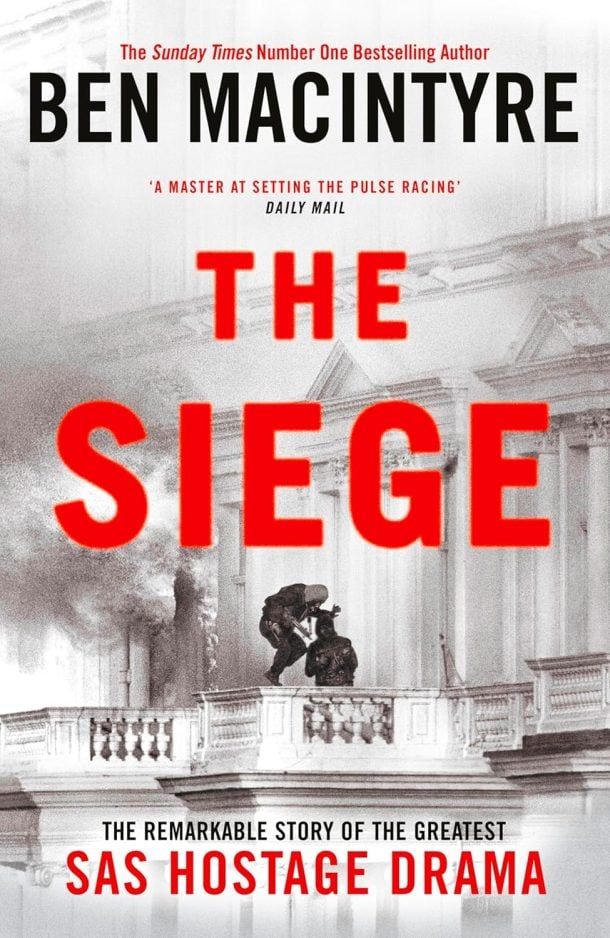 The Siege by Ben Macintyre
The Siege by Ben Macintyre
Fly-on-the-wall account of an Iranian embassy siege other than the one most Americans remember. On April 30, 1980, six young Arab men, seeking independence for the Arab-majority Iranian province of Khuzestan, entered the Iranian embassy in London and seized more than two dozen hostages, including Britons. Macintyre turns all this into high drama: after all, as he notes, “Britain had never before faced an international hostage-taking incident on this scale, and the siege changed forever the way terrorism was perceived, and dealt with.” The hostage takers were new at the game, too, and the Iranian captives, representing the new government of the ayatollahs, were hapless, albeit McIntyre writes of the young ambassador, “His revolutionary credentials were impeccable, his religion extreme, and his devotion to Khomeini obsessive.” Both the Iranian government and the British government refused to negotiate, the Iranian authorities adding that the hostage takers were doubtless in the employ of the CIA. One captive was killed, after six days, to force some sort of resolution. It came, writes Macintyre, in the form of a counterterrorist attack, something that the leader of the captors divined: “They are going to invade,” he said, promising that, if so, every hostage would be killed. Instead, a detachment of Special Air Service commandos breached the embassy and killed five of the six young Arabs; all the remaining hostages but one survived. In the end, Macintyre writes, the SAS action “cemented Margaret Thatcher’s reputation as an iron-willed leader,” which was further bolstered by Britain’s victory in the Falklands War shortly thereafter. McIntyre makes a good case in closing for considering the hostage crisis the opening shots of the eight-year Iraq-Iran War, an appalling bloodletting in which more than a million soldiers died. A capable work of true-crime writing that connects many subsequent geopolitical dots. Kirkus Reviews, August 2024.
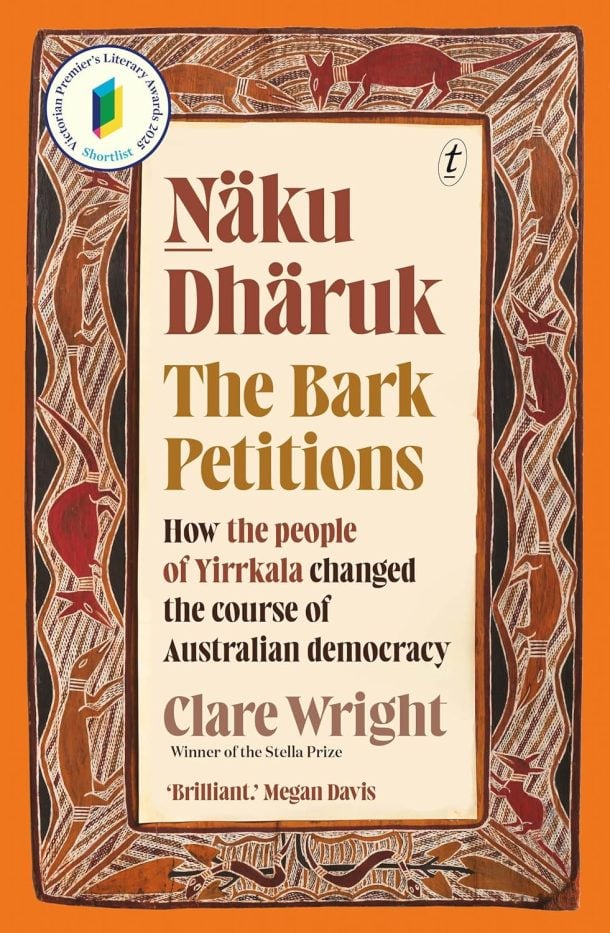 Naku Dharuk The Bark Petitions by Clare Wright
Naku Dharuk The Bark Petitions by Clare Wright
In the nation’s parliament building, in the national museum, and in a private collection are four Bark Petitions (Näku Dhäruk) that tell of the Yolŋu plaintive bid in 1963 to be included in decisions relating to the Australian Government’s proposed exploitation of Yolŋu traditional lands. The petitions were in response to federal government plans to mine bauxite across Yolŋu Country. This meticulously researched book completes Clare Wright’s ‘Democracy’ Trilogy and gives voice to the Indigenous Land Rights movement that emerged – to the government’s consternation – from their own unilateral policy decision. Before critics argue that Indigenous narratives should not be written by White historians, it must be noted that Wright was welcomed into and lived within the Yolŋu community. In 1963, Paul Hasluck, a minister in the Menzies government, ordered the sequestration of land on the Gove Peninsula in order to mine bauxite – the ore precursor to aluminium. Unsurprisingly, Yolŋu leaders objected. Within the Yirrkala mission, cultural traditions and language were retained. The petitions were written in both English and in Language. After receipt of the petitions, an investigation found that the government’s actions overrode Yolŋu sentiment and traditional land custodianship. The determination was that (obviously) consultation should have occurred. Wright’s masterful writing – studious but not overbearing – ensures that this is neither dry nor dusty. It explains how elemental the Näku Dhäruk were in the emergence of the Land Rights movement in clear, digestible language. Good Reading Magazine, March 2025.
Return to top
ROMANCE
| Heiss, Anita | Red Dust Running |
| Stanley, Jessica | Consider Yourself Kissed |
| Turner, Darlene L. | K-9 Ranch protection |
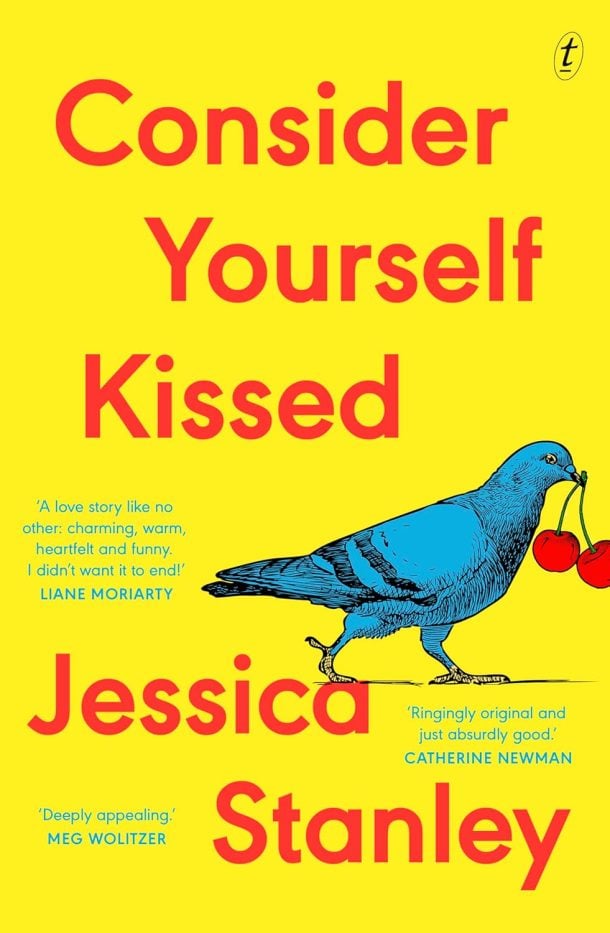 Consider Yourself Kissed by Jessica Stanley.
Consider Yourself Kissed by Jessica Stanley.
Consider Yourself Kissed is the second novel by Australian author Jessica Stanley. An ode to home in all its forms, this is a charming account of a decade of womanhood.We meet Coralie when she is young, freshly in London, anonymous. It’s 2013. She brings with her dreams of writing and a box of books by Helen Garner. She meets an attractive journalist, Adam, in a series of very convenient meet-cutes (for this we forgive Stanley, because Adam’s daughter, Zora, is one of the cutest literary toddlers ever to exist). As Coralie’s life entwines with Adam’s, we see her put everything on the table for a familial life thousands of kilometres away from her own. Ceasing to write, renovating a home that isn’t hers, Coralie is slipping away into the UK. On returning home, she realises her relationship to her country and, by extension, to herself, is dynamic. Stanley offers us an authentic perspective on what it is to migrate, to hold two identities in your hands. At times, you may wish the writing embraced more of the grit of falling in love or feeling deathly homesick. Consider Yourself Kissed shines when Coralie’s emotions are messy, when she gives in to her raw, emotional rage.This book relives the past decade from the eyes of a middle-class mother. Stanley writes humorously about the state of our world. While Coralie’s life fluctuates, so does the British political landscape (remember Boris Johnson?). The ensemble of characters is lovable; there is no far-fetched villain or cataclysmic subplot to push the novel along. It’s the story of a real woman surrounded by her flawed but ever-present blended family; when you reach the end of this book, you’ll have laughed, nodded, and sighed – and you will miss the children who grew up in front of you. Readings Magazine, March 2025.
Return to top
New additions to eBooks at SMSA
EBOOKS
| General | Mahloudji, Sanam | The Persians |
| Historical | Lennon, Ferdia | Glorious exploits |
| Mystery | Caro, Jane | Lyrebird |
| Mystery | Challinor, Deborah | Black silk and sympathy |
| Mystery | McTiernan, Dervla | The unquiet grave |
| Mystery | Osman, Richard | We solve murders |
| Non-Fiction | Robbins, Mel | The let them theory |
| Romance | Gilmore, Laurie | The Cinnamon Bun Book Store |
| Romance | Spencer, Minerva | The dueling duchess |
| Sci-fi/Fantasy | Bell, Cadance | Letters to our robot son |
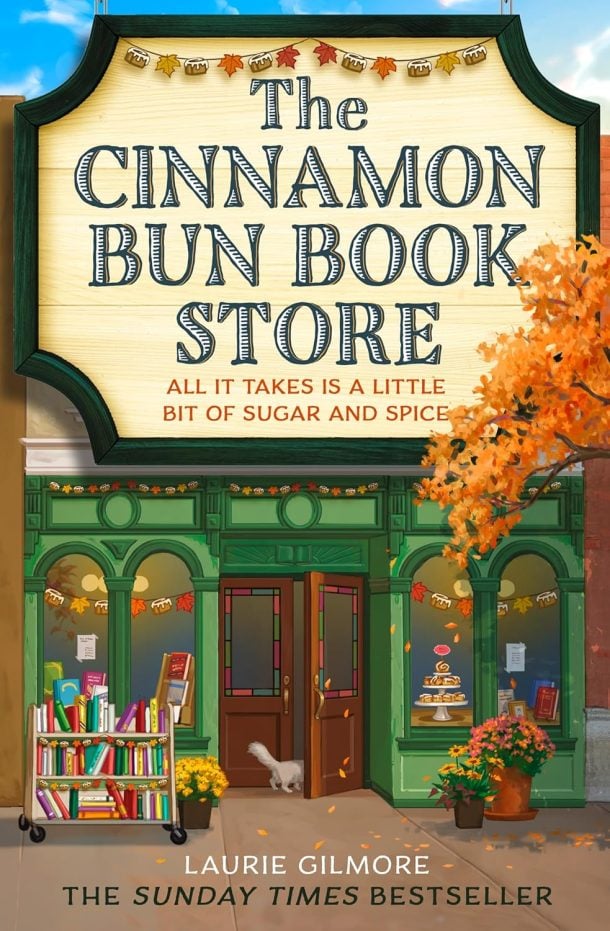 The Cinnamon Bun Book Store by Laurie Gilmore
The Cinnamon Bun Book Store by Laurie Gilmore
A small-town bookseller stumbles upon a scavenger hunt in Gilmore’s bighearted second Dream Harbor contemporary (after The Pumpkin Spice Cafe). Bookish introvert Hazel Kelly wouldn’t consider herself adventurous. She still lives in her hometown and has a job at the bookstore where she’s worked since her sophomore year of high school. But with her 30th birthday fast approaching, Hazel is in desperate need of a shake-up. When she discovers a mysteriously highlighted passage—“Come with me, lass, if you want adventure”—in a shelved romance novel, she takes it as a sign to dig deeper and finally venture out of her bubble. Further highlighted passages indicate a broader mystery. Eager to help Hazel follow these cryptic clues is charming fisherman Noah Barnett, the town’s most eligible bachelor. Working together gives Noah the opportunity to spend more time with the woman he’s been crushing on for months. With her head finally out of a romance novel, will Hazel finally notice what’s been right in front of her? The treasure hunt keeps the story moving, but it’s also low stakes enough that this falls firmly in the cozy camp. The result is a charming break from reality. Publisher’s Weekly, July 2024.
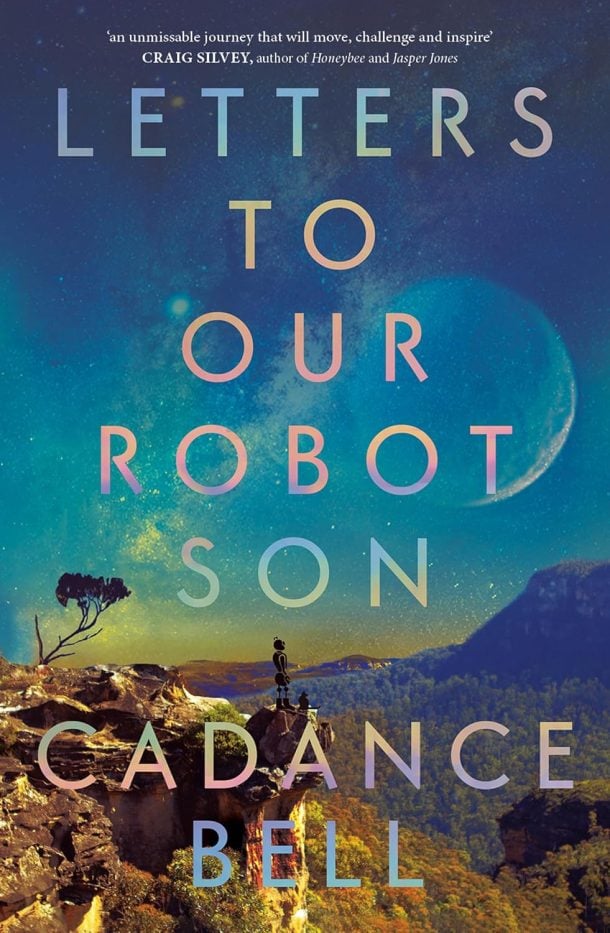 Letters to Our Robot Son by Cadance Bell
Letters to Our Robot Son by Cadance Bell
Letters to Our Robot Son is the fiction debut of memoirist Cadance Bell (The All of It: A Bogan Rhapsody), a mercurial science fiction novel about a robot who awakens without memories and wanders into the world with nothing but an endless supply of optimism and curiosity to sustain him. Set in a post-human (but importantly, not post-apocalyptic) New South Wales, the story follows Arto, the primary character, as he explores his surroundings, searching for his history and purpose. While Arto is piecing together his story, readers – who possess more context than this robot – will also be seeking answers about what happened in the world. The novel begins in Arto’s first-person point-of-view, but a shocking event midway through shifts both the reader’s understanding of the world (and its future) and the narration itself. With arch commentary on corporate greed and humanity’s drive for hierarchy, Letters to Our Robot Son will likely appeal to literary fiction readers wanting to engage with science fiction conceits rather than keen science fiction fans, who might find the pacing slow and details sparse. Readers who enjoyed the delicate use of horror in Julia Armfield’s Our Wives Under the Sea or the speculative fiction elements of Laura Jean McKay’s The Animals in That Country would be ideal readers for this novel. Books+Publishing, March 2025.
 Glorious Exploits by Ferdia Lennon
Glorious Exploits by Ferdia Lennon
Lennon brings ancient Sicily to life with humor and pathos in his stunning debut. Thousands of Athenian soldiers are being held prisoner in Syracuse after a failed assault during the Peloponnesian War. Two unemployed potters, Lampo and Gelon, decide to recruit some of the prisoners, who have been left to die in quarries near the city, to perform a selection of Euripides’ plays in exchange for food. Gelon, fearing the defeat of Athens could mean the end of its rich history of tragic drama, wants to stage Medea and The Trojan Women, the latter of which depicts the grim aftermath of Troy’s defeat in the Trojan War. Lampo becomes increasingly invested in the project and discomfited by the brutal treatment of Sicily’s vanquished rivals. By giving his leads a sense of purpose during dark and bloody times, Lennon makes the success of their offbeat venture feel important to the reader, and he thoroughly explores the novel’s melancholy central theme—the world is “a wounded thing that can only be healed by story”—all the way up to the gut-punch denouement. It’s not all dreary, though. Lampo’s crackling modern vernacular adds just the right amount of levity, as when he comments on the hot weather: “Even the lizards are hiding, poking their heads out from under rocks and trees as if to say, Apollo, are you fucking joking?” Lennon’s vital tale captivates. Publisher’s Weekly, December 2023.
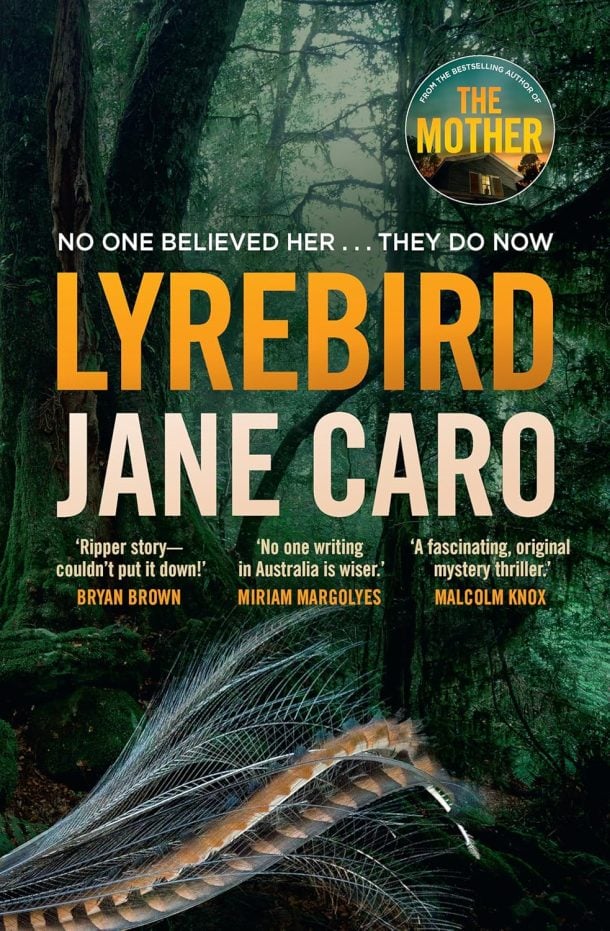 Lyrebird by Jane Caro
Lyrebird by Jane Caro
Walkley Award-winning journalist, social commentator and author Jane Caro (The Mother) returns to crime fiction for her second adult novel, The Lyrebird. The titular bird first appears in the prologue, when student ornithologist Jessica Weston films the male superb lyrebird’s mating dance and song in Burraga Swamp, New South Wales. To her horror, the lyrebird mimics the dying screams of an unknown woman. She is laughed out of the police station by all but the lowest ranked police detective, Megan Blaxland, and the lyrebird’s evidence is ignored for 20 years until a landslip reveals a woman’s skeleton in the swamp. Now a retired senior sergeant, Megan returns to the police force to close the cold case. Police enquiries expose a dark history of illegal brothels and human trafficking as bushfires close in on the investigators and suspects. The environmental threat gives the plot a needed urgency given that a small pool of suspects is identified mid-way through the novel. In the guise of a detective novel, Lyrebird is a keening cry of grief and outrage, asking: how can people do these things to each other? How can we do this to the planet? The lyrebird’s mimicry of human terror serves as both an exceptional narrative hook and a poignant symbol of nature bearing witness to humanity’s crimes. Recommended for readers who want crime fiction that confronts the real world, such as Martine Kropkowski’s Everywhere We Look and Louise Milligan’s Pheasants Nest. Publisher’s Weekly, February 2025.
 We Solve Murders by Richard Osman
We Solve Murders by Richard Osman
Bestseller Osman (the Thursday Murder Club mysteries) launches a promising new series with this sprightly tale of a father- and daughter-in-law who join forces to take down a shadowy killer. At the outset, bodyguard Amy Wheeler is on an island off the coast of South Carolina shielding bestselling novelist Rosie D’Antonio from a Russian oligarch who threatened to kill her after she used his real name in her latest book. While Amy and Rosie discuss the recent deaths of two popular influencers, someone takes a shot at them, and they narrowly escape. Meanwhile, private detective Steve Wheeler—father to Amy’s husband, Adam—is in the Hampshire village of Axley searching for a client’s lost dog when Amy calls to ask for his backup. He agrees, and as he helps Amy try to determine who tried to kill her (and why), more influencer bodies start piling up, the crime scenes strewn with evidence framing Amy for the murders. Steve and Amy then embark on a globetrotting quest to pin down their adversary that takes them from Ireland to Dubai. Osman pulls off the tricky task of making his leads both zany and human, with a sufficiently brain-teasing mystery to boot. This series is sure to garner a loyal following. Publisher’s Weekly, August 2024.
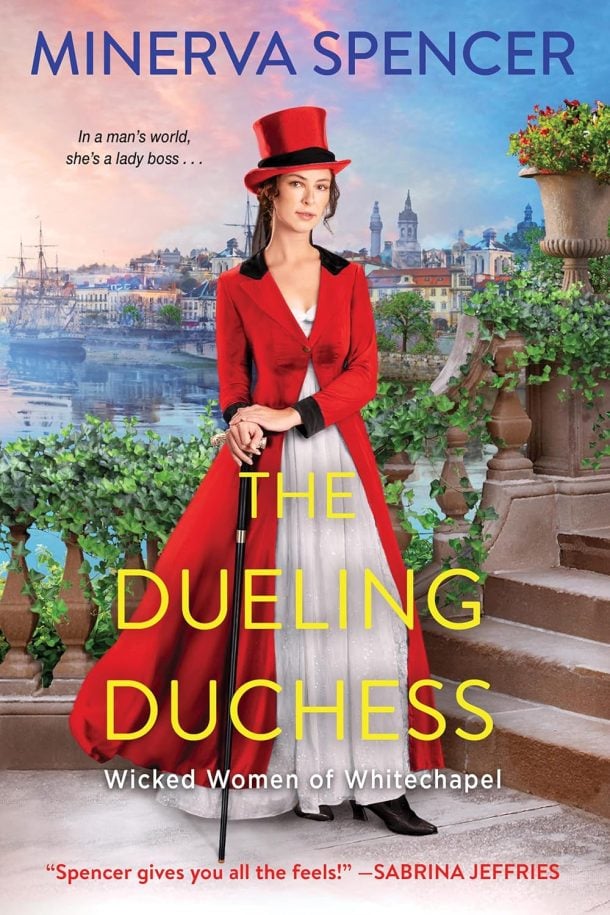 The Dueling Duchess by Minerva Spencer
The Dueling Duchess by Minerva Spencer
Spencer’s alluring second Wicked Women of Whitechapel novel (after The Boxing Baroness) stars Cecile Tremblay, one of four owners of Regency England’s first all-women circus, Farnham’s Fantastical Female Fayre, who also performs as a crack shot in one of the circus’s most popular acts. When Cecile’s former lover Guy Darlington shows up at her circus pleading for a job as Cecile’s assistant/drudge after losing his fiancée and his dukedom to his long-lost cousin, Cecile reluctantly takes him on. She has not forgotten how Guy previously insulted her with an offer to install her as his mistress while he went on to wed a more suitable woman. As the pair spend more time together, however, Cecile sees that he truly regrets his previous behavior and he confesses he’s never stopped loving her. But can guarded Cecile tear down her walls and open up about her mysterious past enough to return his feelings? The unusual backdrop of the circus continues to set this series apart, and the resilient female supporting cast add both charm and humor to the sensuous romance. Readers won’t want to put this down. Publisher’s Weekly, April 2023.
Return to top
AUDIOBOOKS
| General | Bostwick, Marie | The book club for troublesome women |
| General | Caine, James | The couple at the lake house |
| General | McFadden, Freida | The crash |
| General | Nova Glass, Seraphina | Nothing ever happens here |
| Mystery | Amphlett, Rachel | The eleventh grave |
| Mystery | Todd, Marion | Dead man’s shoes |
| Mystery | Winters, Mary | Murder in season |
| Non-Fiction | Glover, Dennis | Repeat: A warning from history |
| Sci-fi/Fantasy | Jones, Nick | And then she vanished |
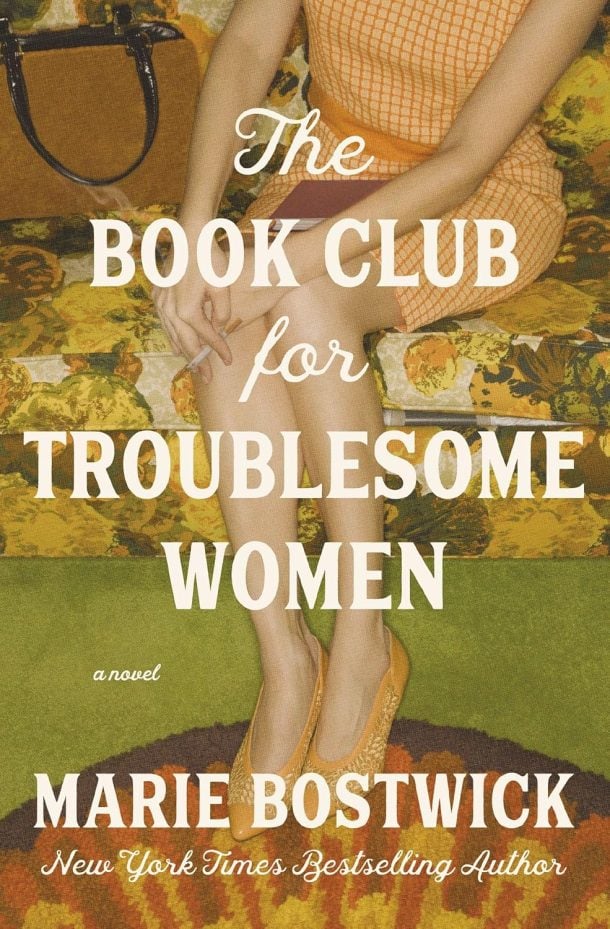 The Book Club for Troublesome Women by Marie Bostwick
The Book Club for Troublesome Women by Marie Bostwick
Margaret Ryan has the perfect early1960s life–she has a brand-new house in a planned suburb in Virginia, three children, and a husband who works hard to provide for the family. And yet, she has a nagging sense that there is more to life. Her best friend, Viv, is a mother of six and, while she loves being a mother, she sometimes misses the excitement and fulfillment she had as a nurse during WWII. Bitsy is a young newlywed, married to an older man. Marge, after meeting an unconventional new neighbor, Charlotte, decides to start a book club. Charlotte only agrees to join if she can pick the book, the newly published (and controversial) Feminine Mystique, by Betty Friedan. Their first meeting shows each of these women that their longing for more is not unique to them, and the Bettys are born. Over the course of one year, these four women bond, grow, and forge lifelong friendships. Bostwick (Esme Cahill Fails Spectacularly, 2023) has written another charming, winning novel, perfect for those who love book clubs, nostalgia for the 1960s, and stories of female friendship. Booklist, February 2025.
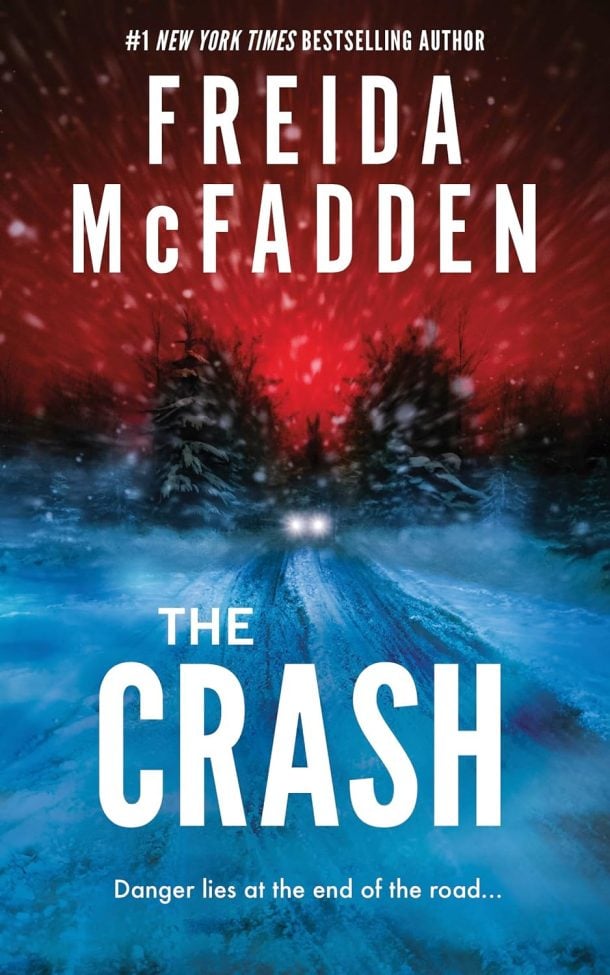 The Crash by Freida McFadden
The Crash by Freida McFadden
A pregnant young woman seeks shelter from a winter storm and finds herself in far more harrowing circumstances in this solid if familiar outing from bestseller McFadden (The Boyfriend). Tegan Werner, 23 and eight months pregnant, lives alone in Lewiston, Maine, where she barely stays afloat by working double shifts at a supermarket. On a dark December evening, she sets out to visit her brother; soon, a gentle snowfall worsens into a full-blown blizzard, and her car spins out and crashes into a tree. Alone in the middle of nowhere, nursing a painful ankle injury and desperately anxious about the safety of her unborn child, Tegan is approached by a burly man who introduces himself as Hank and invites her into his nearby home. With no other option aside from freezing to death in her car, Tegan accepts—to her tremendous detriment. Narrated in alternating chapters by Tegan, Hank, and Hank’s wife, Polly, McFadden’s Misery-esque setup grows increasingly absurd on its way toward a preposterous series of late-stage twists. Still, the narrative’s brisk pacing and frequent cliffhangers make it easy to wolf down in a single sitting. McFadden’s fans will enjoy themselves. Publisher’s Weekly, October 2024.
 And Then She Vanished by Nick Jones
And Then She Vanished by Nick Jones
A man with newfound powers of time travel strives to harness his energy to save the sister who’s been missing since childhood. In the summer of 1997, Joseph Bridgeman took his little sister, Amy, to the local fun fair. While he was trying to win her a prize, she vanished, never to be seen again. In 2019, Joseph still has not entirely recovered. Nor has his family, his father having ended his own life because he couldn’t bear what happened to Amy; his mother’s in a home with vascular dementia, never sure who’s who or where she is. Joseph has managed somewhat better. His ability to feel energy and communicate with objects amounts to a special power. But although he has one of Amy’s hair ties, his power is more a sidebar than the main attraction. An insomniac with all-too-little communication with money, Joseph isn’t sure what’s next in life until his accountant, Martin, refers him to a hypnotherapist to help him at least get a full night’s sleep. Kind, warm, and not particularly woo-woo, Alexia Finch isn’t exactly what Joseph expects, though he hadn’t known what a hypnotherapist does and still isn’t sure when he leaves her office. He feels calmer but not much else–until that night, when he goes back in time. He’s back in the present before he can understand what happened, but when he does, he’s sure he’s found the key to saving Amy. Will it be that simple? Time travel with all the humor and none of the pesky paradoxes. Kirkus Reviews, February 2021.


